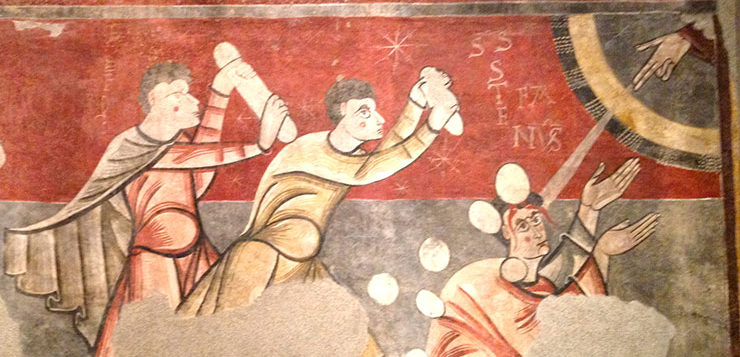DON’T MISS ANYTHING! ONE CLICK TO GET NEW MATILDA DELIVERED DIRECT TO YOUR INBOX, FREE!
There’s a few bad apples (and eggs) in the federal government’s legislation aimed at protecting ‘religious freedom’, writes Jonathon Hunyor.
Of all the metaphors that have been used in the debate about the Religious Discrimination Bill – swords, shields, mountains, molehills and lawyers’ picnics among them – the one that has come to my mind and stuck is that of the curate’s egg.
It’s an expression that comes from an old cartoon in which a junior clergyman is at breakfast with a bishop. The bishop notes that the curate’s egg is no good. The curate, keen to be polite, insists that ‘parts of it are excellent’.
When it comes to the Religious Discrimination Bill, parts of it are, indeed, excellent. But its flaws mean it is, ultimately, a rotten egg.
Much of the commentary on the Bill has overlooked the significant, even radical, way that it overturns established norms and principles – not just of our system of protection from discrimination, but good law-making itself.
BE PART OF THE SOLUTION: WE NEED YOUR HELP TO KEEP NEW MATILDA ALIVE. Click here to chip in through Paypal, or you can click here to access our GoFundMe campaign.
Australia doesn’t have a comprehensive regime of human rights protections. Instead we rely on a patchwork of laws, including a suite of anti-discrimination Acts at Commonwealth, State and Territory level. These cover a range of grounds, including sex, disability, age, race, sexual orientation, pregnancy and marital status. An important feature of the system has been that the regimes coexist, to respect local variations and allow for improvements over time in the protection of rights.
The decision to add religion to the list of Commonwealth protections against discrimination is welcome. But this Bill does more than that.
Instead of serving up the ‘classical’ formulation of anti-discrimination protection we were promised, the government has tied itself in knots trying to privilege the rights of some over others. This is done in two ways in the Bill.
The first is by distorting the test of ‘reasonableness’ that applies to situations of ‘indirect discrimination’. Indirect discrimination occurs when a general rule unreasonably disadvantages a certain group: for example, requiring people to be over a certain height to be eligible for a job may disadvantage women and be indirect sex discrimination unless it is reasonable.
The Bill’s so-called ‘Folau’ provisions will apply to conduct rules imposed by organisations, where those rules might disadvantage some employees because they wish to speak out in line with their religious views. The Bill seeks to pre-empt what a court should consider and find is ‘reasonable’ when assessing those rules. For big businesses, they will need to show the rules are ‘necessary’ to prevent ‘unreasonable financial hardship’. Other issues that might concern good corporate citizens (like a commitment to diversity) won’t be enough.
But the ordinary test for ‘reasonableness’ – which requires a court to consider all the circumstances of the case – is perfectly able to deal with this situation. Creating special provisions for people wanting to express religious views that may humiliate or insult others is unnecessary and introduces a level of complexity that does no favours to people wanting to know what their rights are, or organisations wanting to make sure they comply with the law.
The same problem arises with provisions relating to conscientious objection for health service providers. Again, the Bill does not allow for the ordinary test of reasonableness to apply when a person wishes to discriminate in refusing health services for reasons of conscience.
Instead, the Bill intervenes to privilege the right of the provider to withhold the service over the right of the patient or customer to receive the service without discrimination because they are, for example, unmarried or in a same-sex relationship.
However, the Bill’s most exceptional feature is that it overrides State and Territory laws that provide protection against discrimination. Under the Bill, certain ‘statements of belief’ will not constitute discrimination for the purposes of any discrimination law.
In practice this means that discrimination laws will offer no protection to a wide range of humiliating, insulting or ridiculing comments. For example, if a manager decides to tell a gay staff member at a staff meeting that their sexual orientation is an abomination and they are going to hell. Or a childcare provider tells a single mother during the morning drop-off that she is sinful because her child needs two parents.
It’s no small thing for the Commonwealth to override State and Territory laws. It is done very rarely. What is remarkable here is that it is being done on the slimmest of grounds: just two cases (one against the Catholic Archbishop of Hobart in 2015, one against the Baptist Union of Queensland in 2018) in which statements relating to same-sex marriage were the subject of complaints.
Neither case was ever likely to succeed. Neither made it to court. But now two discontinued claims in well over two decades is said to justify the Commonwealth intervening, and abandoning the long commitment to the coexistence of State and Territory anti-discrimination regimes.
This is not a sound basis for making laws. Instead, it seems to reflect successful lobbying by religious organisations that enjoy significant political power.
It may not be too late to save this Bill, but for now we should put politeness to one side and send it back to the kitchen.
BE PART OF THE SOLUTION: WE NEED YOUR HELP TO KEEP NEW MATILDA ALIVE. Click here to chip in through Paypal, or you can click here to access our GoFundMe campaign.
Donate To New Matilda
New Matilda is a small, independent media outlet. We survive through reader contributions, and never losing a lawsuit. If you got something from this article, giving something back helps us to continue speaking truth to power. Every little bit counts.




